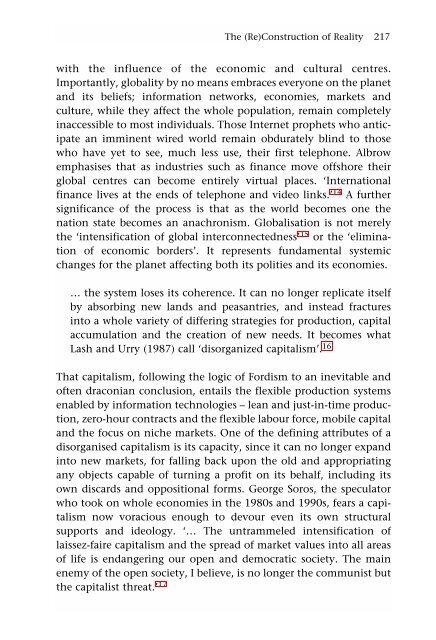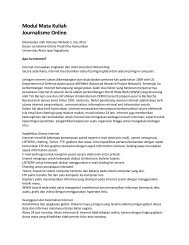Online Journalism - Ayo Menulis FISIP UAJY
Online Journalism - Ayo Menulis FISIP UAJY
Online Journalism - Ayo Menulis FISIP UAJY
Create successful ePaper yourself
Turn your PDF publications into a flip-book with our unique Google optimized e-Paper software.
The (Re)Construction of Reality 217<br />
with the influence of the economic and cultural centres.<br />
Importantly, globality by no means embraces everyone on the planet<br />
and its beliefs; information networks, economies, markets and<br />
culture, while they affect the whole population, remain completely<br />
inaccessible to most individuals. Those Internet prophets who anticipate<br />
an imminent wired world remain obdurately blind to those<br />
who have yet to see, much less use, their first telephone. Albrow<br />
emphasises that as industries such as finance move offshore their<br />
global centres can become entirely virtual places. ‘International<br />
finance lives at the ends of telephone and video links.’ 14 A further<br />
significance of the process is that as the world becomes one the<br />
nation state becomes an anachronism. Globalisation is not merely<br />
the ‘intensification of global interconnectedness’ 15 or the ‘elimination<br />
of economic borders’. It represents fundamental systemic<br />
changes for the planet affecting both its polities and its economies.<br />
… the system loses its coherence. It can no longer replicate itself<br />
by absorbing new lands and peasantries, and instead fractures<br />
into a whole variety of differing strategies for production, capital<br />
accumulation and the creation of new needs. It becomes what<br />
Lash and Urry (1987) call ‘disorganized capitalism’. 16<br />
That capitalism, following the logic of Fordism to an inevitable and<br />
often draconian conclusion, entails the flexible production systems<br />
enabled by information technologies – lean and just-in-time production,<br />
zero-hour contracts and the flexible labour force, mobile capital<br />
and the focus on niche markets. One of the defining attributes of a<br />
disorganised capitalism is its capacity, since it can no longer expand<br />
into new markets, for falling back upon the old and appropriating<br />
any objects capable of turning a profit on its behalf, including its<br />
own discards and oppositional forms. George Soros, the speculator<br />
who took on whole economies in the 1980s and 1990s, fears a capitalism<br />
now voracious enough to devour even its own structural<br />
supports and ideology. ‘… The untrammeled intensification of<br />
laissez-faire capitalism and the spread of market values into all areas<br />
of life is endangering our open and democratic society. The main<br />
enemy of the open society, I believe, is no longer the communist but<br />
the capitalist threat.’ 17
















